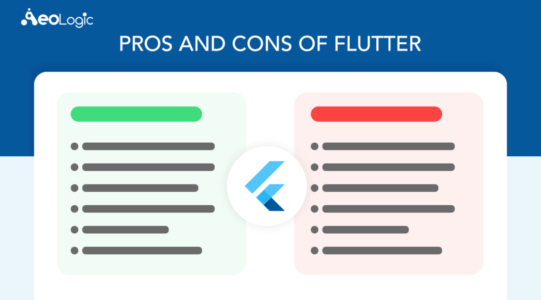Flutter App Development
Flutter is an open-source mobile application development framework created by Google. It is used to develop applications for Android and iOS, as well as being the primary method of creating applications for Google Fuchsia.
One of the best features, cross-platform independence that flutter provides to its users.Since app development companies are looking for cross-platform dependency to develop new mobile applications so that it’s source code can be used on other platforms also.
In this blog we are going to discuss all Flutter is about that is its Pros And Cons.
Pros :
- Cross-Platform Independence: With this function, there’s no need to write codes for two different platforms.
 You can build just once, have one codebase, and use that one codebase for two applications. Flutter also provides Google fuchsia platform, which is an experimental operating system and many also think that it can be a replacement for Android in the upcoming future.
You can build just once, have one codebase, and use that one codebase for two applications. Flutter also provides Google fuchsia platform, which is an experimental operating system and many also think that it can be a replacement for Android in the upcoming future.  Hot Reload: Hot Reload is considered to be one of the biggest advantages of flutter because of this the app developers are able to see all the changes, including the minor ones in the code right away. Hot reload enables better collaboration between developers and designers when they want to improve how the app looks and check effects immediately.
Hot Reload: Hot Reload is considered to be one of the biggest advantages of flutter because of this the app developers are able to see all the changes, including the minor ones in the code right away. Hot reload enables better collaboration between developers and designers when they want to improve how the app looks and check effects immediately.- Great for MVP: If you want to showcase your products and services offered as soon as possible, can be done by using flutter cross-platform app development that looks native on both Android and IOS. Since it develops native codes for different platforms at one time, it saves time, efforts as well as money. Below is the sample of our work during a seminar and it was being developed by using flutter only in 20 min, our developer did the task.
 Provides Access to Native Features: Some platform-specific functions like camera and geolocation require access to native features. These functions need to be implemented by means of native languages, Since flutter is a cross-platform application it allows us to reuse the existing Java, Swift, and Objective-C codes to access native features and sdks on IOS and Android.
Provides Access to Native Features: Some platform-specific functions like camera and geolocation require access to native features. These functions need to be implemented by means of native languages, Since flutter is a cross-platform application it allows us to reuse the existing Java, Swift, and Objective-C codes to access native features and sdks on IOS and Android. Includes Less Codes: Flutter uses Dart programming language for it’s an operation which is object-oriented and strongly typed. Flutter directly resembles React Native which uses JavaScript and increases app startup time and overall performance. Dart uses AOT (Ahead-of-Time) and JIT (Just-in-Time) compilations which allows a hot reload capability to refresh the UI during development without the need for an entirely new build. Since fewer codes are involved in app development it also reduces the chances of bugs in codes.
Includes Less Codes: Flutter uses Dart programming language for it’s an operation which is object-oriented and strongly typed. Flutter directly resembles React Native which uses JavaScript and increases app startup time and overall performance. Dart uses AOT (Ahead-of-Time) and JIT (Just-in-Time) compilations which allows a hot reload capability to refresh the UI during development without the need for an entirely new build. Since fewer codes are involved in app development it also reduces the chances of bugs in codes.- Widgets: Widgets are necessary for an application interface and view to the end users, it must have a customer friendly look and feel regardless of the screen it’s loaded upon. Since Flutter is rich in widgets it helps in creating more customized complex widgets. Flutter has a full set of widgets in Google’s Material Design and in Apple’s style with the Cupertino pack. Widget rendering happens directly in the Skia engine without using Original Equipment Manufacturer widgets. So we get a smoother UI experience compared with other cross-platform frameworks.
CONS:
- Libraries are limited: Google has launched flutter with various features but somewhere it lacks in some functionalities the user is looking for since it’s a relatively new framework. Native apps, on the contrary, have everything in their native SDKs including Stripe, Twilio, and most streaming services such as Wowza and UStream. With Flutter, developers would have to build these libraries themselves, which is time-consuming.
 Less community support: Flutter is getting popular day by day but still now it lacks in community support, it has built an immersive support community with hundreds and thousands of flutter enthusiasts. But it’s still not enough as you already know other frameworks have large community support.
Less community support: Flutter is getting popular day by day but still now it lacks in community support, it has built an immersive support community with hundreds and thousands of flutter enthusiasts. But it’s still not enough as you already know other frameworks have large community support.- Lacks In Web Apps: Flutter is limited to mobile applications development only, it lacks in web application development which is one of the biggest disadvantages of using flutter. Nowadays businesses want those applications which can dynamically cope up with mobile and web browsers. Thus, flutter lacks flexibility in terms of web apps.
 Continuous Integration: As Flutter is in its early stages there are not a number of CI(Continuous Integration) Platforms that can provide support to it, this includes Jenkins and Travis.
Continuous Integration: As Flutter is in its early stages there are not a number of CI(Continuous Integration) Platforms that can provide support to it, this includes Jenkins and Travis.
CONCLUSION :
As of now, it’s quite clear what makes flutter better than other frameworks and in what all it lacks. But overall according to me it’s a better framework there are minor cons in it too but by the time it will become more accurate. It’s expert advice that one should give flutter a try as it’s still in this beta stage and will surely improve in the upcoming months.











